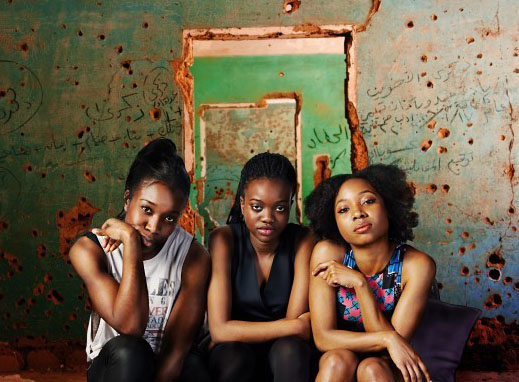
In the late hours of April 14, 2014, almost three hundred schoolgirls were abducted from the Government Secondary School in the Nigerian town of Chibok.
Written by Theresa Ikoko, Girls gives the audience an imagined insight into what life might be like for three of them over an unspecified period of months after their abduction. Through their conversations, jokes, dances, and bitter arguments, the audience learns more about not only the girls themselves, but about the situation in Nigeria, the international pull of Beyoncé, and how survival is not one-size-fits-all.
Haleema is wilful and independent. Coded as a lesbian, she does not bow to the wills or fancies of men in the same way that Ruhab (girlish and vain, though caring) does. Tisana is the youngest, sweet and wildly imaginative, occasionally to her detriment. She thinks she might become a living martyr.
It is hard to think of what to say about this show while avoiding platitudes. It deals with topics that could be uncomfortable, but handles them deftly, with humour and style. Its script is tight and smart, packed with dialogue that is poetic in its truth. Its leads are charming, and magnetic.
No one outshines the others. Each actor has their finer individual moments, some of which are truly impressive, but it is the balance between the trio that is the best work. The characters have known each other since they were younger, and their relationships feel lived in on-stage. History colours each of their interactions.
The staging is simple, but not simplistic. Props are used sparingly but effectively, and each lighting change feels important. Only once (at the close of the show) did it feel like the stage effects were not quite doing the work that they should have been, but this is of no real detriment.
Earlier this year one of the Chibok girls was found pregnant in the Sambisa Forest, a stronghold for Islamic insurgents in Nigeria, and the first location featured in Girls. Of the original 276 students taken, approximately a fifth have escaped, but the rest remain in captivity, to be used as tools in negotiation. Only last month, in August 2016, Boko Haram released a video, in which it was stated that 40 of the girls have been married off, and some have been wounded or killed by Nigerian air strikes. Dead bodies are shown. Ikoko’s play remains as powerful and vital today as it was on its debut.
Go and see this. And if you Tweet about it, make sure you also talk about it. ★★★★★ Will Amott 21st September 2016

